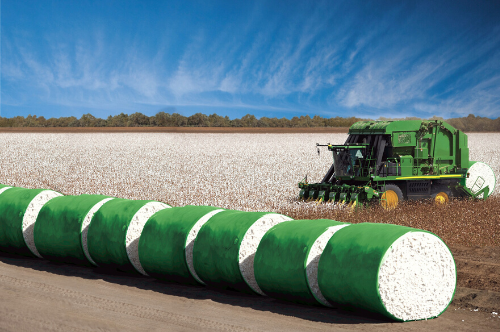You may have read in past articles of Barnhardt Natural Fibers initiatives to elevate awareness of extraneous contamination in the US cotton crop, and specifically plastic contamination. As a quick review, the primary origin of plastic contamination comes from one of two sources; John Deere module covers or field cover used when transplanting land from a prior crop requiring black ground cover.
NCC, USDA Combine to Champion Reduction of Plastic Contamination
The US Department of Agriculture and National Cotton Council have both done a great job in creating awareness of these issues as well as conducting educational programs for reducing this type of contamination. As a result of the increasing use of the John Deere module collectors, as well as the increased opportunities for the plastic cover to be mishandled by either the farmer at collection or the ginner during the processing of the module, the USDA on July 1 of this year introduced Codes 71 & 72 for plastic contamination.
However, the agency left open the opportunity for the farmer to resubmit samples from the same bale. The probability that a farmer would submit another sample with plastic contamination is most improbable as the bales are downgraded if coded 71 or 72.
New Codes 71/72 Created to Reclassify Contaminated Bales
More recently, the National Cotton Council’s Quality Task Force adopted a new position regarding reclassification procedures for code 71 or 72. This recommendation was made at the August 23rd meeting, which doesn’t allow enough time to implement the new policy with the 2019 crop as harvesting and ginning have already begun. In response, the NCC board has requested that both farmers and ginners refrain from resampling code 71 or 72 bales containing plastic on a voluntary basis in 2019 and make it mandatory with the 2020 crop.
The Need for Superior Purification Processes Remains
Barnhardt sees the National Cotton Council’s proposed reclassification program as a giant step forward in controlling this type of contamination. Farmers don’t want their cotton discounted any more than absolutely necessary, and they will take the necessary precautions to handle and collect the cotton and prevent plastic from getting into the harvest. The same is true for the ginner in handling the modules when unloading them.
Our company recognizes that no program will ever eliminate 100 percent of plastic, nor any other type of contamination, for that matter. This universal truth illustrates our mandate to continuously invest in our process to provide the cleanest, purest cotton available in the marketplace.
